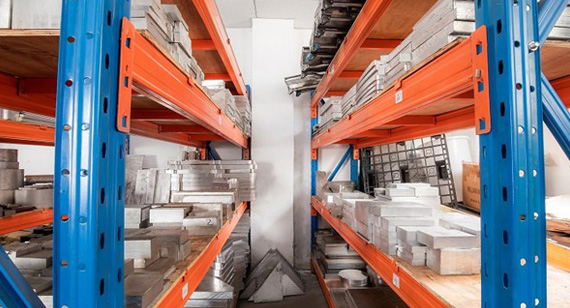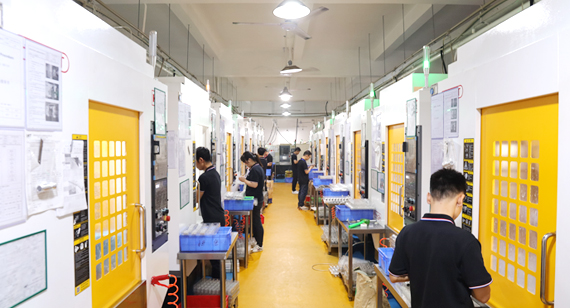15 years one-stop China custom CNC machining parts factory

Hey there I’m VMT Sam!
With 25 years of CNC machining experience we are committed to helping clients overcome 10000 complex part-processing challenges all to contribute to a better life through intelligent manufacturing. Contact us now
 243 |
Published by VMT at Sep 24 2023
243 |
Published by VMT at Sep 24 2023
What is 4M CNC Machining Manufacturing?
4M CNC machining manufacturing refers to the management and optimization of the manufacturing process in the field of CNC machining by considering four key factors: Material, Machine, Method, and Man.
1.Material: The selection of appropriate materials is crucial for the quality and performance of machined parts. In 4M CNC machining manufacturing, considerations include the material's hardness, strength, wear resistance, as well as its machinability and availability.

2.Machine: Choosing suitable CNC machine tools, tools, and the right machining parameters is essential to achieve high precision and efficiency. In 4M CNC machining manufacturing, factors like machine tool accuracy, stability, rigidity, as well as tool selection and toolpath planning are significant considerations.

3.Method: Developing a rational machining process and operational methods can lead to improved machining efficiency and quality. In 4M CNC machining manufacturing, factors such as machining sequence, cutting speeds, feed rates, cutting depths, process parameter optimization, and adjustment are vital.
4.Man: Well-trained and competent personnel are crucial to ensuring machining quality and efficiency. In 4M CNC machining manufacturing, personnel should be trained to acquire knowledge and skills in CNC programming, machine operation, and machining processes. Proper staffing and management are also important.
By comprehensively considering these four factors, 4M CNC machining manufacturing aims to optimize the machining process, enhance production efficiency, and facilitate improvements and innovations in machining processes.
What are the advantages of 4M CNC machining and manufacturing?
The advantages of 4M CNC machining manufacturing are as follows:
1.High Precision: CNC machine tools can achieve high precision machining, meeting micron-level accuracy requirements, ensuring the accuracy of part dimensions and shapes.
2.High Efficiency: CNC machine tools are characterized by automation and high-speed machining, significantly increasing machining efficiency and saving production time.
3.Flexibility: The machining process of CNC machine tools can be modified through program changes to accommodate the machining of different parts, offering high flexibility and adaptability.
4.Excellent Repetition: CNC machine tools can replicate the machining of the same part through saved programs, ensuring consistent quality of machining.
5.Strong Programmability: CNC machine tools are controlled by CNC programs, allowing for the machining of complex shapes and offering high programmability.
6.High Automation Level: CNC machine tools can be integrated with automation equipment and systems, enabling the establishment of automated production lines to enhance production efficiency and reduce labor costs.
7.Superior Surface Quality: CNC machine tools allow precise control of cutting tools and machining parameters, enabling the achievement of high surface quality requirements and reducing the need for subsequent finishing processes.
In summary, 4M CNC machining manufacturing offers advantages such as high precision, efficiency, flexibility, repeatability, strong programmability, high automation level, and superior surface quality. It is suitable for the machining needs of various complex parts.
The Significance of 4M in CNC Machining and Manufacturing
The significance of 4M (Manpower, Machine, Material, Method) in CNC machining manufacturing can be summarized in the following aspects:
1.Manpower (Man): Personnel are a crucial factor in the CNC machining process, as their skill levels and operational abilities directly impact machining quality and production efficiency. Through training and skill enhancement of operators, their proficiency and work efficiency can be improved, reducing operational errors and the occurrence of accidents.
2.Machine (Machine): CNC machine tools are the core equipment in CNC machining, and their performance and condition directly affect machining precision and stability. Through proper maintenance and upkeep of these machine tools, their normal operation and long-term stability can be ensured, thus enhancing machining quality and production efficiency.
3.Material (Material): The choice and quality of machining materials directly affect the machining process and product quality. Through analysis and selection of material characteristics, it is possible to ensure the machinability of materials and meet product quality requirements.
4.Method (Method): The selection and optimization of machining methods are crucial for improving machining efficiency and reducing costs. Through analysis and optimization of machining processes and process parameters, it is possible to increase machining efficiency, reduce energy consumption, and achieve higher production efficiency.
In summary, the significance of 4M in CNC machining manufacturing lies in its ability to comprehensively analyze manpower, machine, material, and method, identifying problems and improvement opportunities, and subsequently optimizing the machining process to enhance machining quality and production efficiency. It can assist in the formulation of reasonable production plans and resource allocation to maximize the utilization of both human and machine resources, thereby improving production efficiency.
4M CNC Machining and Manufacturing Applications
4M CNC machining manufacturing has wide-ranging applications in the manufacturing industry, including but not limited to the following areas:
Automotive Manufacturing: CNC machining plays a crucial role in automotive manufacturing. It can be used to machine engine components, chassis parts, and vehicle body structures to ensure precision and quality, thereby enhancing vehicle performance and safety.
Aerospace: The aerospace sector demands high precision and quality for components, and CNC machining meets these requirements. It can be employed to machine aircraft engine components, flight control system parts, aerospace structural components, and more.
Electronics Equipment Manufacturing: The manufacturing of electronic equipment requires high-precision components, a need that CNC machining fulfills. It can be used for machining electronic equipment housings, heat sinks, connectors, and other critical parts.
Medical Device Manufacturing: Medical devices have strict requirements for precision and quality, making CNC machining a suitable choice. It can be applied to machine artificial joints, implantable devices, surgical instruments, and more.
Tool Manufacturing: CNC machining is used in the production of various tools, including cutting tools, molds, and measuring instruments. It enhances tool precision and longevity while improving production efficiency.
General Machinery Manufacturing: CNC machining is utilized in the production of various general machinery, such as CNC lathes, CNC milling machines, CNC grinding machines, and more. It enhances machining precision and production efficiency in this sector.
In summary, 4M CNC machining is widely applied across various industries, including automotive manufacturing, aerospace, electronics equipment manufacturing, medical device manufacturing, tool manufacturing, and general machinery manufacturing.
Conclusion:
4M CNC machining manufacturing represents a comprehensive management approach. By considering factors like manpower, machine, material, and method, it optimizes the machining process, thereby improving machining quality, production efficiency, and resource utilization. This approach holds significant value in modern manufacturing, helping businesses enhance their competitiveness and market position.
Ready To Start Your Next Project?
Get Instant Quote

Request a Free Quote
Send us a message if you have any questions or request a quote. We will get back to you ASAP!